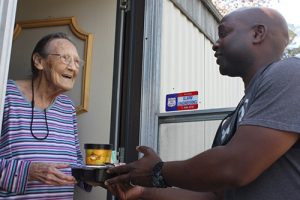
By Peggy Bradford
Special To The Dispatch
SALISBURY — “The truth is, I was in dire need of food when Meals on Wheels started bringing my food.”
That’s what Meals on Wheels recipient Rebecca, age 91, recalls.
Rebecca isn’t alone. On the Lower Shore, many seniors don’t have access to adequate nutrition. The circumstances may differ: lack of transportation to the grocery store, health issues that make it difficult or impossible to prepare a meal, no money to buy food. Often, food takes a back seat to other expenses necessary for life.
Food insecurity is the most broadly-used measure of food deprivation in the U.S. The U.S. Department of Agriculture defines food insecurity as “consistent access to adequate food limited by a lack of money and other resources.”
Elderly suffering from food insecurity and hunger experience more difficulties in performing activities of daily living, can become more vulnerable to falls, and have an increased incidence of illness, hospital admission and nursing home placement.
The Meals on Wheels initiative ensures that seniors have access to adequate nutrition even when family support, mobility and resources are lacking.
On the Lower Shore, the average meal recipient is over age 78, and lives alone on a very limited income; in fact, 99 percent of program participants fall below the poverty level.
The program provides much more than a nutritionally balanced meal; the Meals on Wheels driver may be the only person a senior sees that day.
There are many lonely, isolated, frail seniors here on the Lower Shore and often their only contact with the outside world is through the Meals on Wheels program.
The meal delivery also serves as a safety check. Frail elderly are at an increased risk of medical emergencies, falls and accidents. A routine meal delivery ensures that in case of an emergency, there will be someone coming into the home.
“As you get older, everybody just disappears on you. I need Meals on Wheels in order to live,” said MOW participant Rebecca, who is 91.
Last year, nearly 72,000 meals were delivered to seniors on the Lower Shore. That need is growing. Currently, Meals on Wheels are delivered only four days a week; in some remote areas, meals are delivered only twice a week; other areas are not served at all. Nearly half of recipients have indicated they are in need of additional meals.
In an effort to increase services to meet the growing need, MAC recently launched a Campaign to Feed the Elderly on the Lower Shore.
A few Meals on Wheels recipients, including Rebecca, have shared their stories in a video, created for MAC by PAC 14. To view the video, click on the link, https://youtu.be/0oh_cDTwb9A
Everyday people in our community have to make decisions about priorities in their life. Do they buy food? Do they pay their electric bill? Can they pay for their prescription drugs?
We all want to maintain our independence, we all want to age with dignity. Yet, when you have to deliberate over paying one bill or the other, we’re robbed of these things.
Each of us can make those decisions a little easier. We have the power. Our donations to MOW help make life much better, help restore dignity, to those people in our community who are most in need.
“It’s wonderful to have somebody think about us old people,” Rebecca said. “Sometimes it seems like everybody has disappeared. We don’t have anybody.”
MAC’s mission is to preserve dignity and promote optimal health and independence of older adults through services and education. MAC is a member agency of the United Way of the Lower Eastern Shore.
For more information about MAC’s Campaign to Feed the Elderly, call 410-742-0505, ext. 115 or 118, or email [email protected].
(The writer is the executive director of MAC Inc., the Area Agency on Aging.)
